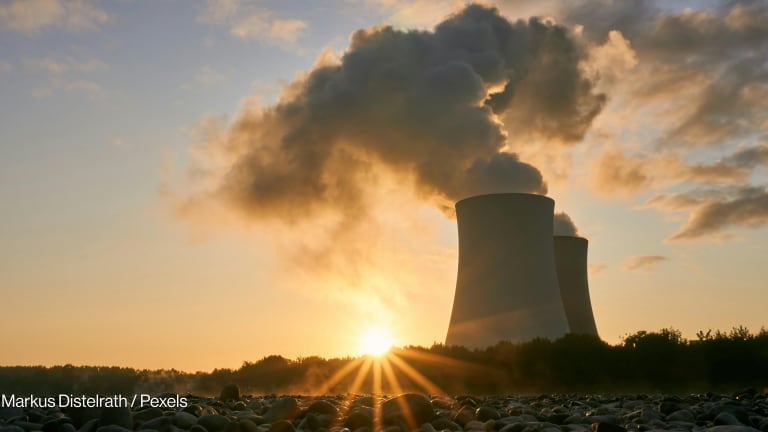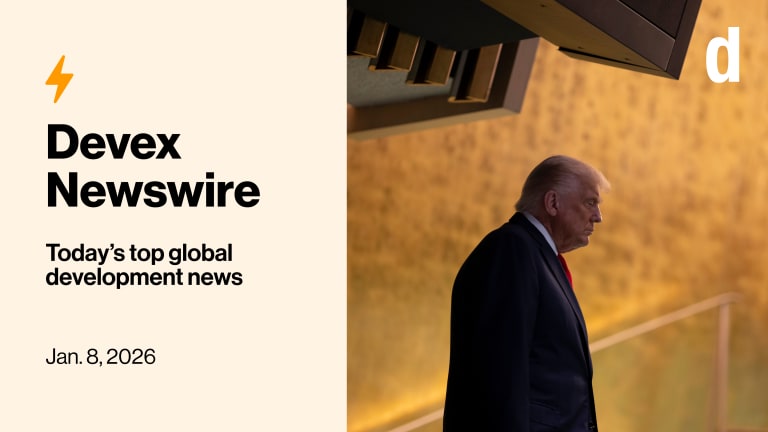
KUALA LUMPUR, Malaysia — The day after President Donald Trump announced that the United States would leave the landmark Paris Agreement on climate change, Malaysia’s minister of natural resources and environment released a statement expressing his frustration with the decision.
“The world’s most vulnerable, already impacted by increasingly frequent and severe extreme weather events can no longer tolerate petulant attitudes and retrogressive decisions,” said Haji Wan Junaidi bin Tuanku Jaafar. “Malaysia remains committed to achieving the objectives of the convention and its Paris Agreement.”
But Malaysia and many developing countries may not be able to deliver on their commitments. That’s because their individual targets to reduce emissions, as part of the Paris climate accord’s overall goal to keep global warming well below 2 degrees Celsius, is predicated on receiving outside financial and technological support, including from the U.S.
“Without the U.S. there will be an even wider climate finance gap,” says Meena Raman, climate change coordinator for the Malaysia-based nonprofit, Third World Network. “Whether other developed countries will step in to fill it is uncertain. That leaves developing countries in a quandary.”
Trump’s decision will have impacts across the developing world, but the ramifications for Asia are especially significant. According to the Asian Development Bank, 21 Asian megacities with a population of 10 million or more are poised to contribute more than half the rise in global greenhouse gas emissions over the next 20 years — if no action is taken. In addition to Mumbai, Shanghai and Beijing, that figure includes relatively poorer cities with fewer resources such as Manila and Jakarta.
See more related topics:
► Development experts dismayed as US exits Paris climate agreement
► After Trump, can Europe fill the gap on climate action?
► China could gain clout if US backs out of climate commitments, experts say
► Melanesian nations question global responses to climate change
► How to reframe climate programs in an era of climate denial: Lessons from Australia
“Many Asian megacities are still growing, so this is the right time to intervene to make investments [that are] both low carbon and climate resilient,” says Ancha Srinivasan, a principal climate change specialist at the ADB. “By 2035, Asian megacities are where the battle against climate change will likely be won or lost.”
Currently, funding for climate change adaptation and mitigation initiatives in Asia’s megacities is extremely limited, and within that foreign contributions, including those from the U.S., constitute even less. According to the U.S. government’s overview of their international climate finance spending from 2010 to 2015 the country contributed roughly $3.6 billion in climate change funding to Asia. By comparison, an ADB report released last February says that the region could need to invest over $240 billion each year just to ensure that its infrastructure is disaster and climate resilient. Aware of such vast challenges, the U.S. had reiterated its commitment to increasing its support under the Paris climate agreement.
By 2020, developed countries agreed to cumulatively dedicate $100 billion each year to help developing countries, including those in Asia, mitigate and adapt to the effects of climate change. Now with the U.S. decision, President Trump’s “skinny budget” calling for a virtual elimination of U.S. international climate finance, and the same funding likely to face challenges in Congress, U.S. contributions will decrease further. “And given Trump’s deeply distorted attack on the Green Climate Fund, it’s hard to predict which countries will or will not dig deeper to make up for the U.S.’s failure to live up to our $3 billion commitment to the GCF,” says Karen Orenstein, deputy director of the economic policy program at the nongovernmental organization Friends of the Earth, where she oversees international public climate finance. The U.S. has so far paid one-third of its pledge. “Different people within different governments have said different things.”
Meeting climate targets at home?
The American people could also carry on the mantle for their country. With the federal government refusing to fulfill its obligation to tackle climate change, several U.S. cities, states and businesses have come together pledging to meet the U.S.’s commitment to the Paris climate agreement. That includes the U.S. Climate Alliance, the “We Are Still In” campaign, and a Bloomberg Philanthropies led effort called America’s Pledge.
But these movements are overwhelmingly focusing on taking local action to meet the U.S. emissions reduction targets under the accord, not on how they can provide funding for developing countries. Still, such a move is not unprecedented. Cities have contributed to the GCF. Paris pledged 1 million euros in 2015 for example. Orenstein also points to Michael Bloomberg’s “pretty clever” decision to give up to $15 million to the United Nations, to help make up for the U.S withdrawal from the Paris Agreement. And the U.S. state of Massachusetts is contemplating providing support for the U.N.’s Least Developed Countries Fund, which supports developing countries’ adaptation initiatives.
“Hopefully, other Americans will be inspired to counter Trump’s anti-science, inhumane agenda and help raise money,” says Orenstein. “We need to do more education in the U.S. to let people know about the legal and moral obligation of the U.S. to provide climate change funds for developing countries.”
Even before President Trump was elected, the U.S. wasn’t a climate leader in several ways. It left the Kyoto Protocol, watered down the Paris Agreement, and has contributed less than its fair share of international climate finance. But, the U.S. was able to galvanize climate action in a way that is unique and difficult for any other country to replace. When assessing what makes a global climate leader, ADB’s Srinivasan recommends looking at four key areas: Domestic climate commitments, and contributions to technology, finance and capacity building. Japan and China may potentially lead in technology development and dissemination respectively, while India could lead in capacity building. But none of these countries can lead in all four areas.
“The U.S., as the only superpower in the world, can lead in all four areas,” says Srinivasan. “However, as the U.S. president declared his intention to quit the Paris Agreement, the U.S. may not be able to.”
The EU and China — shortcomings
In the past couple of weeks, much attention has been given to the role that China and the European Union could play as emerging leaders in global climate action. Europe could take leadership in all the four aforementioned areas, but its ability to do so is constrained by internal political developments. These include Brexit, security issues and efforts by Eastern European countries, such as Poland and the Czech Republic, to undermine the region’s climate commitments.
Meanwhile, China would be an unconventional leader. It is the world’s largest polluter, but also a renewable energy powerhouse. China produces two-thirds of the world’s solar panels, constructs nearly half of all the new wind turbines, and commissioned more new hydroelectric power last year than any other country. Through 2020, China plans to spend over $360 billion on renewables.
“China sees climate change not just as a global burden to be reluctantly shared among countries, but more and more as an opportunity to organize domestic governance for achieving domestic benefits,” says Yuan Xu, an associate professor in energy and sustainability at the Chinese University of Hong Kong.
Grappling with some of the world’s worst air pollution and corresponding public outcry from its growing urban middle class, Chinese leaders are more interested in surpassing the U.S. in their domestic emissions reductions outlined in the Paris Agreement. China is unlikely to be an international climate leader that helps developing countries mitigate and adapt to the effects of climate change. Even China’s roughly $3 billion South-South Climate Cooperation Fund is given to developing countries that are borrowing money for dirty technologies. For instance, if a country agrees to borrow $100 million to build a coal-fired power plant, China is ready to provide a few million dollars from the fund for somewhat improved technologies within that power plant.
Earlier this month China, which has long perceived the possibility of a pact with Europe as a balancing strategy against the U.S., joined the EU to reaffirm their commitment to the Paris Agreement. And just this week, the vice president of the Asian Infrastructure Investment Bank, Thierry de Longuemar, said that the China-backed bank will not be financing coal-fired power plants.
“With the U.S. decision to pull out of the Paris Agreement and China stepping up to provide some leadership, this does not bode well for transparency provisions.”
— Michael Oppenheimer, professor of geosciences and international affairs at PrincetonBut, that doesn’t mean that China has stopped investing in dirty energy completely. Beneath the veneer of pro-climate action, both the economies of China and Europe remain heavily reliant on coal and oil.
Through other initiatives, such as the so-called Silk Road Fund, and under the country’s “One belt, one road” plan, which is designed to foster economic ties and support through infrastructure building, China continues to provide development assistance for coal-fired power plants across Asia and throughout the developing world. According to a 2016 study conducted by the Institute for World Economics and Politics at the Chinese Academy of Social Science and Boston University, from 2007 to 2014, Chinese development banks collectively loaned almost $120 billion to increase energy access in developing countries. Two thirds of that money went toward building coal-fired power plants, coal mines and large hydropower dams, which the study argues would exacerbate climate change and deforestation in the Amazon rainforest.
Xu says that China’s domestic coal power plants, which are running at about half capacity, are now facing one of the most stringent emission standards in the world. However, without similar regulations and effective enforcement in other developing countries, whether the Chinese investment in coal-fired power plants abroad will behave like they do in China is a big question. “Especially in the first few years, they will not voluntarily comply with the Chinese domestic standards, but adapt to the lower local standards,” says Xu. “Only after the problem becomes visible and serious, will they change.”
And as countries committed to the Paris Agreement continue to work on developing a roadmap of how to implement it, some climate experts are concerned about what will happen to key issues, such as transparency and accountability, which the U.S. was a big advocate for to the ire of China. “With the U.S. decision to pull out of the Paris Agreement and China stepping up to provide some leadership, this does not bode well for transparency provisions,” says Michael Oppenheimer, a professor of geosciences and international affairs at Princeton, and a member of the Intergovernmental Panel on Climate Change, a U.N. group that produces scientific reports aimed at informing global policy makers.
An uneasy collaboration
Meanwhile, ProPublica reported that over the past few months, the E.U. has been quietly pushing the Trump administration to fast-track approvals of multi-billion dollar terminals for exporting the U.S.’s copious amounts of shale-drilled natural gas as liquefied natural gas, or LNG. Then last April, Secretary of Energy Rick Perry, told Bloomberg: “We’re out in the public and they’re giving all these speeches about the Paris accord and all the things we’re going to do, and we get into private meetings, it’s like, ‘How do we get that LNG?’” he said referring to the E.U., later adding: “Don’t get up on the front end and make all these speeches about how good you’re doing, when the fact of the matter is you’re not.”
To be fair, the Obama administration also worked hard to expand gas networks to Europe. But, now the global outcry against climate change has reached a new high in light of President Trump’s decision to pull out of the Paris Agreement and other anti-environmental acts. There is still hope. Barring any efforts by the Trump administration to leave the U.N. Framework Convention on Climate Change, the mechanism through which the Paris Agreement was made, Trump cannot actually submit his intention to withdraw until 2019. After that, the process will take a year and Trump will be up for re-election. Still, Asian megacities don’t have time to waste. Grappling with sea level rise and extreme heat waves, these cities have no choice but to keep pushing forward, hoping that the U.S. and other developed countries overwhelmingly responsible for their predicament will do the right thing and come to their aid.
Over 10 weeks Devex and our partners will take an in-depth look at the innovative financing mechanisms driving forward the 2030 sustainable development agenda. We’ll explore how the funding gap can be filled, ask how cross-sector collaboration can lead to improved global health care, and look at what it takes to build successful partnerships for change. Join us as we examine the innovative financing powering the Global Goals by tagging #Going4Goals and @devex.








